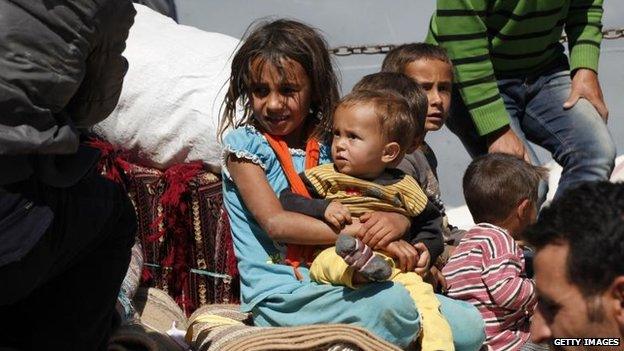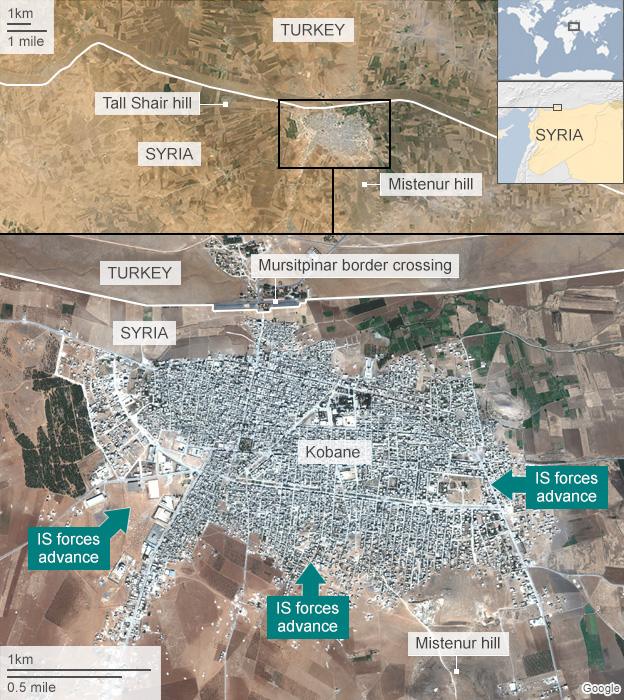Turkey Kurds: Kobane protests leave 19 dead
- Published
Kurdish protesters and riot police clashed in towns and cities across Turkey
At least 19 people have been killed in clashes involving Kurdish protesters in Turkey, reports say.
They are unhappy at what they see as Turkish support for Islamic State (IS) militants attacking the border town of Kobane.
Riot police used tear gas and water cannon in a number of towns and cities as the disturbances spread across the country, including Ankara and Istanbul.
Violent protests also erupted on the streets in Germany.
Curfews have now been imposed in several cities in south-eastern Turkey with large Kurdish populations.
Kurds across Europe protest to demand action over IS attacks in Kobane
Ten of the deaths occurred in the main Turkish-Kurdish city of Diyarbakir, where the rioting saw shops and buses set on fire as well as reported clashes between Kurdish activists and supporters of Islamist groups sympathetic to IS.
Deaths were also reported in the eastern provinces of Mardin, Siirt, Batman and Mus. Many more were injured, and there were casualties in Istanbul and the capital Ankara as trouble spread further west.
While much of the unrest involved Kurdish protesters clashing with police, some of the violence was between Kurdish opponents of IS and radical Islamist Kurds who back the group.

Analysis: Mark Lowen, BBC News, in Istanbul
The sudden wave of unrest has taken Turkey by surprise, with protests spreading to almost 30 cities.
Curfews are now in place, in some provinces for the first time in over two decades, and Turkish troops have been deployed.
Some of the violence has been between Kurdish groups and supporters of Islamic State. But the main protests have been directed against the Turkish government, with Kurds calling for military intervention in the besieged town of Kobane.
Turkey's President Erdogan has reiterated that his country will only get more involved if the coalition targets President Bashar al-Assad as well as IS.
But Washington says the air strikes are focused for now on IS. So Turkey remains unlikely to send troops into Syria - and the worst violence for years with the Kurds here looks set to build.


Civilians continue to flee Kobane across the Turkish border
Turkish Interior Minister Efkan Ala accused the demonstrators of "betraying their own country" and warned them to stop protesting or encounter "unpredictable" consequences.
"Violence will be met with violence. This irrational attitude should immediately be abandoned and [the protesters] should withdraw from the streets," he told reporters in Ankara.
But the outlawed Kurdistan Workers' Party (PKK) called for members and supporters to take to the streets to protest against the IS offensive.
Although a ceasefire was declared in March 2013, after decades of armed struggle the PKK is seen as a terrorist group in Turkey.
Meanwhile, Turkish border police reportedly stopped as many as 300 Kurds who had crossed into Turkey from Kobane.

What the Turkish newspapers are saying:
Most papers are highly critical of the protests. Centre-right Hurriyet denounces them as a "threat to peace", warning they might endanger talks between the government and Kurdish rebels.
It quotes President Erdogan as saying Kurdish politicians are trying to use Kobane to "blackmail" Turkey, a theme taken up by mainstream Milliyet. Centre-right Haberturk warns readers of a "trap", and pro-government Yeni Safak portrays the protesters as "enemies of Turkey".
Several papers use fire analogies, with tabloid Posta referring to "days of fire". Opposition Cumhuriyet says "fire surrounds Turkey", and left-wing Taraf worries that "Kobane fire burns us from the inside".
Only left-wing Birgun is supportive of the protests, running a provocative headline comparing the governing AKP party with Islamic State - "IS in Kobane, AKP in Turkey".

Beyond Turkey, a number of people were hurt when clashes broke out in the German city of Hamburg after hundreds of Kurdish demonstrators in Hamburg held a rally against IS militants.
Some 400 Kurdish protesters fought with a similar number of radical Muslims, police told German media. Demonstrators, some carrying knives and knuckle-dusters, were eventually separated by police firing water cannon.
Injuries were also reported after violence involving members of the Yazidi religious group, most of whom are Kurds, and ethnic Chechens in the town of Celle in Lower Saxony.
